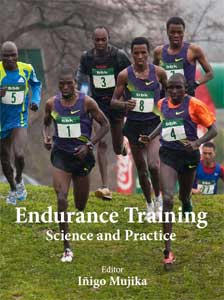Boston Sports Medicine and Performance Group, LLC Blog
Either Way, Registration Ends Monday
Posted by Boston Sports Medicine and Performance Group on Fri, May 9, 2014 @ 08:05 AM
Topics: BSMPG Summer Seminar, Boo Schexnayder, Dave Tenney, Derek Hansen
Dr. John Sullivan Joins The Leaders In Sports Medicine and Performance
Posted by Boston Sports Medicine and Performance Group on Thu, May 8, 2014 @ 06:05 AM
We always hate losing great speakers to unexpected life events, but when a world authority in performance training is able to step in last minute, well, it sort of takes the sting out of it.
BSMPG is proud to bring Dr. John Sullivan to Boston for the 2014 BSMPG summer seminar! We are officially one week away and are ready for the largest seminar to date!
Registration will be open until Monday May 12th - but then its CLOSED!
Sign up today!
See you in a week!

DR. JOHN SULLIVAN
Topic: Readiness – Science and Application
SPONSORED BY:
Dr. John P. Sullivan is the founder and CEO of Clinical & Sports Consulting Services. He is a Clinical Sport Psychologist and Applied Sport Scientist for Providence College, the University of Rhode Island, and within the professional ranks of the NFL, NBA, WNBA, MLS, Olympics, and the Elite Performers of Military. He has worked in the NFL for 13 years coordinating clinical care, human performance technology, and facilitating the league’s Rookie Success Program. He is the Assistant Director of the South County Sports Medicine/Sports Performance Concussion Clinic in Wakefield, Rhode Island. Dr. Sullivan has worked as a mental health professional for nineteen years and provided professional services in a wide variety of settings including hospitals, college counseling centers, and private practice. He is a licensed psychologist and well-rounded clinician/practitioner, having served children, adolescents, adults, and geriatric patients.
Dr. Sullivan is a thought leader who has provided services for a broad variety of athletes, and has served as a consultant, practitioner, lecturer, and researcher in the area of Sport Psychology both domestically and internationally. He is an active member of the Rhode Island Interscholastic League Sports Medicine Advisory Committee, the Big East Conference Sports Medicine Society, and a frequent collaborator with the National Collegiate Athletic Association (NCAA) regarding education initiatives and provides expert oversight. He is currently one of five national experts tapped by the NCAA to provide expert oversight for new guidelines for the NCAA Sports Medicine Handbook to be revised for the Spring of 2012. In the fall of 2012 Dr. Sullivan will be part of a team of sports medicine professionals writing the first consensus statement regarding the treatment of mental health issues with student-athletes. The National Athletic Trainers Association (NATA) is the first professional sports medicine organization to set such standards. Dr. Sullivan similarly serves on several scientific advisory boards for developing technology companies in the areas of sport and well-being.
Dr. Sullivan is a frequent contributor, writing on sport science and sports medicine for peer review journals and the popular press. He will be co-authoring two forthcoming chapters; the first on the merging of technology, neuroscience, biofeedback, and sport/performance psychology in Sport Psychology: On the Way to the Olympic Games and the second chapter focusing on well-being and mental health issues in athletes within Fundamental Concepts in Sport and Exercise Psychology: A project sponsored by the International Society of Sport Psychology due out June 2013. He is also the co-editor of a manuscript examining the science of Recovery Training from a multidisciplinary approach which includes some of the most experienced applied sport scientists from NFL, NHL, Premiere Soccer, Olympic Training Programs, and Collegiate Sports. Dr. Sullivan is currently engaged in research in the areas; concussion assessment/rehabilitation, central nervous system measurement/assessment, recovery training, performance testing, and talent selection.
In 2010 he provided the clinical keynote at the National Athletic Trainers Association (NATA) National Conference in Philadelphia focusing on mental health issues with student-athletes. He was the 2010 recipient of the Rhode Island Athletic Trainers Association Service Award for distinguished service and education in the area of sports medicine.
Topics: BSMPG Summer Seminar, Boo Schexnayder, john sullivan
BSMPG 2014 Just Got Better... Again!
Posted by Boston Sports Medicine and Performance Group on Wed, May 7, 2014 @ 07:05 AM
BSMPG is proud to bring Landon Evans from the University of Iowa to Boston for the 2014 BSMPG summer seminar! We are officially one week away and are ready for the largest seminar to date!
We are keeping registration open until Monday night - but then its CLOSED!
Sign up today!
See you in a week!
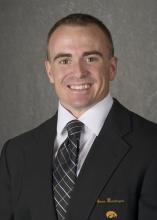
LANDON EVANS
The University of Iowa
SPONSORED BY:
Topic: Applied Nutrition and Hormone Optimization
Landon is in his second year with University of Iowa Olympic strength & conditioning staff.
He also serves as the nutrition coordinator for the teams served by the strength & conditioning department in Olympic Sports. His primary sports are Softball, Men's Sprinters, Throwers and Women's Cross Country Prior to joining the Iowa staff, Evans has been the Director of Sports Nutrition and Assistant Strength & Conditioning Coach at Illinois State for the past two years. He served as the Director of Athletic Development at the Performance Training Center in Beaverton, OR from June 2008– August 2009 and as Associate Director of Strength & Conditioning at Illinois State from January 2005 – May 2008. While a student, he worked in strength & conditioning at Iowa State and Central College.
Evans received a bachelor's of Science in Health & Human Performance from Iowa State in 2005, a master's of Science in Kinesiology and Recreation from Illinois State in 2007 and DPD Concentration in Family & Consumer Sciences, with emphasis on food, nutrition and dietetics from Illinois State 2011. He recently completed a dietetic Internship at Utah State as well.
Landon has also worked with a number of professional athletes who previously or currently compete in the NFL, CFL, AFL, NBA, WNBA, NPF and the Olympics.
He is a Registered Dietitian (RD), Certified Strength and Conditioning Specialist (CSCS) from the National Strength and Conditioning Association, Strength & Conditioning Coach Certified though the Collegiate Strength & Conditioning Coaches Association, as well as a USAW Level 1 Club Coach from USA Weightlifting. He is CPR/AED certified.
Landon resides with his wife, Stephanie, and daughter, Calyn in Coralville, IA.
Topics: Landon Evans, Sports Nutrition
Boston Hosts Largest Functional Range Release Course To Date
Posted by Boston Sports Medicine and Performance Group on Mon, May 5, 2014 @ 07:05 AM
BSMPG hosted over 40 of the most progressive sports therapists here in Boston this May 2-4, 2014 for the largest FR course to date! Our next FR course is sure to sell out again so sign up before the last seat goes!
"The Functional Range Release system is what all other manual therapy techniques will be measured against moving forward."
- Matt Forgie, DC - New Brunswick, Canada

Save the date for FR - UPPER Module - May 22-24, 2015



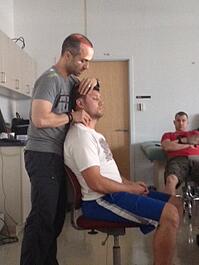

Visit functionalanatomyseminars.com for complete course details
What is Functional Range Release?
Functional Range Release is an advanced system of soft-tissue treatment based in the principles of myofascial release, but with multiple improvements. The treatment system, in combination with the Functional Anatomic Palpation Systems® methods of palpation, focuses on the assessment, localization, and systematic treatment of soft-tissue lesions (adhesions) and areas of fibrosis (scar tissue) which develop as a result of injury, repetitive strain, and cumulative trauma.
Utilizing the trademarked PAIL's Progressive Angular Isometric Loading®) and Tissue Tension Technique®, Functional Range Release® soft-tissue management system expands on the basic tenets of myofascial-release treatments by simultaneously assessing, expanding, and strengthening the patient’s functional range of motion. Through our seminars, the practitioner learns to not only treat tissue, but is also provided a means to assess the tissue in order to make sound clinical decisions.
Learn more about the Functional Range Release system by clicking HERE.
Topics: BSMPG, Andreo Spina, Functional Range Release
INTRODUCTION:
Your “how to” blog post should teach the reader how to do something by breaking it down into a series of steps.
Begin your blog post by explaining what problem you are going to solve through your explanation and be sure to include any relevant keywords. Add in a personal story to establish your credibility on this topic. And make sure to end your blog post with a summary of what your reader will gain by following your lead.
Need some inspiration? Check out these "How-To" examples from the HubSpot blog:
- How to Write a Blog Post: A Simple Formula to Follow
- How to Do Keyword Research: A Beginner's Guide
- How to Write an Effective Meta Description (Yes, They Still Matter)
BODY:
Now deliver what you promised in the first section. This is the longest part of the post, so make it easy to read. Use short paragraphs, bullet lists, and bold headings to set different sections apart.
Some common section headers include:
Step 1: Getting Started
Step 2: Do Your Background Research on…
Step 3: First Steps for…
Step 4: Analyze and Repeat
Step 5: Wrapping Up
You can use bulleted lists, numbered list, or multiple headings. Include as many steps, numbers, or bullets that will allow you to discuss your topic thoroughly.Here are some pointers to make the best possible body of your blog:
- Include visuals
- Include short explanatory phrases in your headers
- At the end, transition into your conclusion
CONCLUSION:
Now it’s time to say goodbye and wrap up your post. Remind your readers of your key takeaway, reiterate what your readers need to do to get the desired result, and ask a question about how they see the topic to encourage comments and conversation. Don't forget to add a Call-to-Action to turn your blog post into a marketing machine!
Congratulations! What a lovely how-to post you've created.
The 2014 Catapult Performance Directors Meeting
Posted by Boston Sports Medicine and Performance Group on Mon, Apr 28, 2014 @ 07:04 AM
THE 2014 CATAPULT PERFORMANCE DIRECTORS MEETING
Mission of the BSMPG Performance Director Forum: To provide the leaders in performance training and medical oversight an opportunity to engage with leaders of similar attitude, vision, and entrepreneurial spirit, while pursuing innovative strategies in performance methodology.
WHEN: Sunday May 18th
WHERE: Somewhere awesome in Boston (you'll find out when you get your registration confirmation)
WHY: Because you want to be #BESTINTHEHISTORYOFEVER
SPEAKERS: See below
SPOTS AVAILABLE: A few spots remain - send notice of interest to bostonsmpg@gmail.com for official invite
DRESS: Business casual
COMPLETE DETAILS: Click HERE for complete details including a full speaker and attendee list.
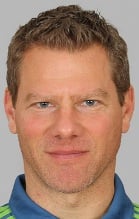
DAVID TENNEY was named the Sounders FC fitness coach on January 9, 2009. He is one of Major League Soccer’s most respected and highly-regarded fitness coaches following two years in Kansas City. On January 1, 2014, Tenney was named Sports Science & Performance Manager for the Sounders. Tenney’s Sports Science & Performance department is the first of its kind in MLS — and is tasked with collecting and analyzing the physiological, physical, and tactical data related to performance, fatigue, and injury prediction. Prior to the Seattle Sounders, Tenney held similar positions with the Kansas City Wizards (now Sporting KC), the George Mason’s Men’s & Women’s teams, and the Washington Freedom (women’s professional soccer).

DR. PHILIP SKIBA is the Program Director for Sports Medicine at Lutheran General Hospital, in Chicagoland. He also serves as acting Program Director for Sport and Exercise Medicine at The University of Exeter, UK. His research studies focus on the determinants of athletic performance in both power / speed and endurance sports. His work has been used by athletes in amateur and elite sport on a regular basis, including the 2012 London Olympic Games. He is the CEO of PhysFarm Training Systems LLC, and has coached a number of world-class athletes, most notably U.S. Olympian, Half-Ironman World Champion and World Record Holder Joanna Zeiger, and 4-Time World Champion Catriona Morrison of Scotland.

DEREK HANSEN is a sports performance consultant based out of Vancouver, B.C., Canada. He currently works as the Director of Athletic Performance at Simon Fraser University. He has worked extensively with coaches and athletes from all levels of high performance including the NBA, NFL, NHL, MLB, CFL and the NCAA. His involvement with Olympic athletes, coaches and teams includes sports such as Track and Field, Speed Skating, Softball, Bobsleigh and Field Hockey, with many of these athletes having won Olympic medals and achieved world record performances.
Derek’s specific areas of expertise include speed development, electrical muscle stimulation for performance, tapering and recovery, and hamstring rehabilitation. Two significant influences in the development of his approach have been Charlie Francis and Al Vermeil. Derek worked closely with Coach Francis from 2001 to 2010, providing coaching to elite athletes and developing Charlie’s educational materials for on-line presentation and seminar delivery. Coach Vermeil has also been a steady source of mentorship to Derek from 2002 to the present day, providing insight into all areas of athlete performance.
When not coaching, Derek is a course conductor with the Canadian National Coaching Certification Program in the areas of Physical Preparation, Recovery & Regeneration and Sport Biomechanics. He has developed a broad series of electrical muscle stimulation protocols for Globus Sport and Health Technologies, known as the SpeedCoach, that integrates EMS programming with conventional training to enhance speed performance. Derek also runs a highly successful Strength and Conditioning apprenticeship program that places young coaches in jobs all over the world.
BSMPG: WHERE LEADERS LEARN
Topics: Philip Skiba, BSMPG Summer Seminar, Dave Tenney, Derek Hansen
Off-Season Training in Professional Sports: The Challenge of New Collective Bargaining Agreements
Posted by Boston Sports Medicine and Performance Group on Fri, Apr 25, 2014 @ 07:04 AM
With most of the teams in the NFL starting their mandatory off-season training this week (Teams with returning head coaches start April 21st. Teams with new head coaches could begin as early as April 7th.), there have been a good number of Strength and Conditioning coaches left wondering if they have enough time to really make an impact with their players. In the past, strength coaches may have had as many as 12 weeks to prepare their players for pre-season training camps scheduled to begin mid-July. However, since the new collective bargaining agreement (CBA) came into effect prior to the 2013 NFL off-season, strength coaches have really only been permitted to undergo fully dedicated training with players for five weeks. This has left a lot of strength coaches to breathe a “collective” sigh and wonder if CBA actually stands for, “Can’t Build my Athletes.”
This phenomenon is not isolated to the NFL. Through conversations with various coaches and consultants working with NHL and NBA teams I have found that many pro sports teams are handcuffed when it comes to making sure their athletes continue to train hard and train smart during the off-season period. One NHL team strength coach commented that he could not contact his players in the off-season to see how their training was going. The players, however, could contact the strength coach if they had any questions or wanted to voluntarily offer information regarding their progress. This struck me as quite odd simply because each team is investing large amounts of money into these players. Shouldn’t the team be able to make sure their players are staying in shape in the off-season? If a player doesn’t follow through on his off-season training program, shows up for training camp out of shape and gets injured, is it not the fault of the player? To me, it sounds like a really big headache for professional teams and something that will become more apparent as the impact of these agreements comes to fruition over the next few years.
Regardless of who is right or who is wrong, it leads me to a number of conclusions regarding how teams and coaches must approach the off-season and, in many respects, the composition of their organizations. Provided below are my thoughts:
1. Talent Reigns Supreme
If training and conditioning is slowly being drawn out of the equation, it remains quite obvious that the teams with the best talent will have the best chance to make it to the post-season, succeed in the playoffs and, ultimately, win the championship trophy. Thus, talent identification becomes even more important and draft day becomes a significantly more anxious time. Because of the pressure mounting on teams to make the ‘right’ selection on draft day, I surmise that teams will over-analyze events such as the NFL combine and run the risk of making even bigger blunders when it comes to ‘building’ their teams. Predictive analytics may seem like the answer to many organizations, but as Henk Kraaijenhof wrote in one of his recent blog articles: “Linear thinking doesn’t work in biology, nor in many other fields.”
2. Character Comes into Play
Players must have the right combination of talent and character to make it work for teams in this new generation of collective bargaining bliss. If teams cannot mandate that players work out with their staff in the off-season, it will be up to the players to find the proper physical trainer and follow an appropriate training program diligently. Michael Jordan had the motivation to build his own basketball court and gym in his house and invite teammates to train with him in the off-season. Do players of this era have the same drive and determination? The salaries are bigger and the commitments are leaner but does this translate into better performance on game-day? In this current climate of non-mandatory off-season work, players must take it upon themselves to “get it done” in the off-season. Consistent communication with team strength and conditioning staff during the off-season must be viewed as a positive effort on the part of the players. It must form the basis of a total team effort throughout the year if a team hopes to be successful.
3. Strength Coaches Must Grow a Personality
Long gone are the days of the growling, shouting strength coach who was known for intimidating players into getting their workouts done in the off-season. Strength coaches must now find new ways to motivate players without insulting them or threatening to go to the coach or GM. In actuality, strength coaches must connect with players on a personal level and develop a relationship of trust. This does not mean that the strength coach becomes the wingman for a pro athlete scoping out the local bars and nightclubs. It does mean that the strength coach must work harder to individualize his services for his players and find out what works best for each athlete that steps into his gym. In cases where the strength coach can contact players in the off-season, a consistent line of communication is a must. This communication cannot take the form of, “Are you getting your workouts done?” It must be more along the lines of, “How are things coming along? Is there anything I can do to make things work better for you?” While some may view this as the growth of a kinder and gentler but more passive strength and conditioning coach, I see it as a necessary adaptation of the profession if strength coaches want to remain relevant and significant contributors.
Continue reading this article by Derek Hansen by clicking HERE.
Join the Leaders in Sports Medicine and Performance at the 2014 BSMPG Summer Seminar - May 16 & 17, 2014.
Registration is now OPEN.

Derek M. Hansen is a sports performance consultant based out of Vancouver, B.C., Canada. He currently works as the Director of Athletic Performance at Simon Fraser University. He has worked extensively with coaches and athletes from all levels of high performance including the NBA, NFL, NHL, MLB, CFL and the NCAA. His involvement with Olympic athletes, coaches and teams includes sports such as Track and Field, Speed Skating, Softball, Bobsleigh and Field Hockey, with many of these athletes having won Olympic medals and achieved world record performances.
Derek’s specific areas of expertise include speed development, electrical muscle stimulation for performance, tapering and recovery, and hamstring rehabilitation. Two significant influences in the development of his approach have been Charlie Francis and Al Vermeil. Derek worked closely with Coach Francis from 2001 to 2010, providing coaching to elite athletes and developing Charlie’s educational materials for on-line presentation and seminar delivery. Coach Vermeil has also been a steady source of mentorship to Derek from 2002 to the present day, providing insight into all areas of athlete performance.
When not coaching, Derek is a course conductor with the Canadian National Coaching Certification Program in the areas of Physical Preparation, Recovery & Regeneration and Sport Biomechanics. He has developed a broad series of electrical muscle stimulation protocols for Globus Sport and Health Technologies, known as the SpeedCoach, that integrates EMS programming with conventional training to enhance speed performance. Derek also runs a highly successful Strength and Conditioning apprenticeship program that places young coaches in jobs all over the world.
Only Four More Weeks - BSMPG is about to Sell Out Again!
Posted by Boston Sports Medicine and Performance Group on Thu, Apr 24, 2014 @ 07:04 AM
Last year we sold out.
This year we are on pace to sell out again.
Don't be that guy that forgot to sign up and then realized he missed out on the most legendary Sports Medicine and Performance Training seminar of all time.
Sign up today at: http://www.bsmpg.com/2014-summer-seminar/
See, that was easy.
May 16 & 17, 2014, Boston MA - 2014 BSMPG Summer Seminar
Join the Leaders in Sports Medicine and Performance at the 2014 BSMPG Summer Seminar - May 16 & 17, 2014.
Registration is now OPEN.
Got Ankle ROM?
Posted by Boston Sports Medicine and Performance Group on Wed, Apr 23, 2014 @ 07:04 AM
Article originally published on: lowerextremityreview.com
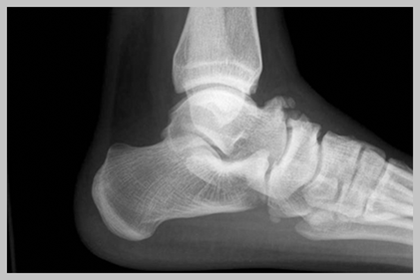
Many knee injury prevention programs do not focus on ankle dorsiflexion range of motion and hip adductor activation, but research suggests both distal and proximal variables contribute to alterations in frontal plane knee biomechanics and could affect injury risk.
By Darin A. Padua, PhD, ATC, and Micheal A. Clark, DPT, MS, PES, CES
Musculoskeletal injuries from sports represent serious long-term health concerns for millions of young Americans.1 Sport and recreational injuries result in seven million physician visits each year,1 with lower extremity injuries comprising 66% of all sports injuries. The knee is the joint most commonly injured.2 Known risk factors for knee injury (e.g., anterior cruciate ligament [ACL] injury, patellofemoral pain, knee osteoarthritis, medial collateral ligament [MCL] injury, and knee cartilage/meniscus damage) include altered frontal plane biomechanics of the knee joint.3-9 Therefore, the effectiveness of knee injury prevention programs may depend on the ability to modify those neuromuscular characteristics that influence frontal plane knee biomechanics.
The hip abductor, extensor, and external rotator muscles (gluteus medius and maximus) are frequently described as critical factors controlling frontal plane knee biomechanics.10,11 Research investigating the influence of gluteal muscle activation, strength, or both on frontal plane knee biomechanics is mixed, with multiple studies showing no association between gluteal muscle function and frontal plane knee biomechanics.12-15 Therefore, other factors that influence frontal plane knee biomechanics may exist. Several recent studies indicate that limited ankle dorsiflexion ranges of motion (ROM) and hip adductor muscle activation are neuromuscular characteristics contributing to altered frontal plane knee biomechanics, and subsequent knee injury risk. The purpose of this review is to highlight the current evidence in this area of study.
Ankle dorsiflexion and knee biomechanics
Restricted ankle dorsiflexion motion is an important factor associated with altered frontal plane knee biomechanics.
Continue to read this article by clicking HERE.
Join the Leaders in Sports Medicine and Performance at the 2014 BSMPG Summer Seminar - May 16 & 17, 2014.
Registration is now OPEN.
A special thanks to:
BSMPG is Boston Strong
Posted by Boston Sports Medicine and Performance Group on Mon, Apr 21, 2014 @ 07:04 AM
BSMPG would like to wish the over 27,000 runners of the 2014 Boston Marathon the best of luck!

Find out how the great endurance athletes from across the world continue to dominante their field from the guy that wrote the book on endurance training at the 2014 BSMPG Summer Seminar - May 16&17th (no we're serious, he literally wrote the book on endurance training, tapering, and peaking for optimal performance).
See the world authority in endurance training, Iñigo Mujika at the 2014 BSMPG Summer Seminar - May 16&17th here in Boston.
There is only one Boston Marathon and there is only one seminar which brings the world's authorities in Sports Medicine and Performance training together for two awesome days of learning.
BSMPG is BOSTON STRONG!


Iñigo Mujika
Keynote Session: Tapering and Peaking for Optimal Performance
Breakout Session: Detraining in Elite Athletes
Iñigo Mujika earned Ph.D.s in Biology of Muscular Exercise (University of Saint-Etienne, France) and Physical Activity and Sport Sciences (University of The Basque Country). He is also a Level III Swimming and Triathlon Coach and coaches World Class triathletes. His main research interests in the field of applied sport science include training methods and recovery from exercise, tapering, detraining and overtraining. He has also performed extensive research on the physiological aspects associated with sports performance in professional cycling, swimming, running, rowing, tennis, football and water polo. He received research fellowships in Australia, France and South Africa, published over 90 articles in peer reviewed journals, four books and 30 book chapters, and has given 210 lectures and communications in international conferences and meetings. Iñigo was Senior Physiologist at the Australian Institute of Sport in 2003 and 2004. In 2005 he was the physiologist and trainer for the Euskaltel Euskadi professional cycling team, and between 2006 and 2008 he was Head of Research and Development at Athletic Club Bilbao professional football club. He was Physiology consultant of the Spanish Swimming Federation in the lead-up to London 2012. He is now the Head of Physiology and Training at Euskaltel Euskadi World Tour Cycling Team, Associate Editor for the International Journal of Sports Physiology and Performance, and Associate Professor at the University of the Basque Country.
Purchase ENDURANCE TRAINING - SCIENCE AND PRACTICE by Dr. Mujika HERE
Join the Leaders in Sports Medicine and Performance at the 2014 BSMPG Summer Seminar - May 16 & 17, 2014.
Registration is now OPEN.
Topics: BSMPG Summer Seminar, barefoot running













